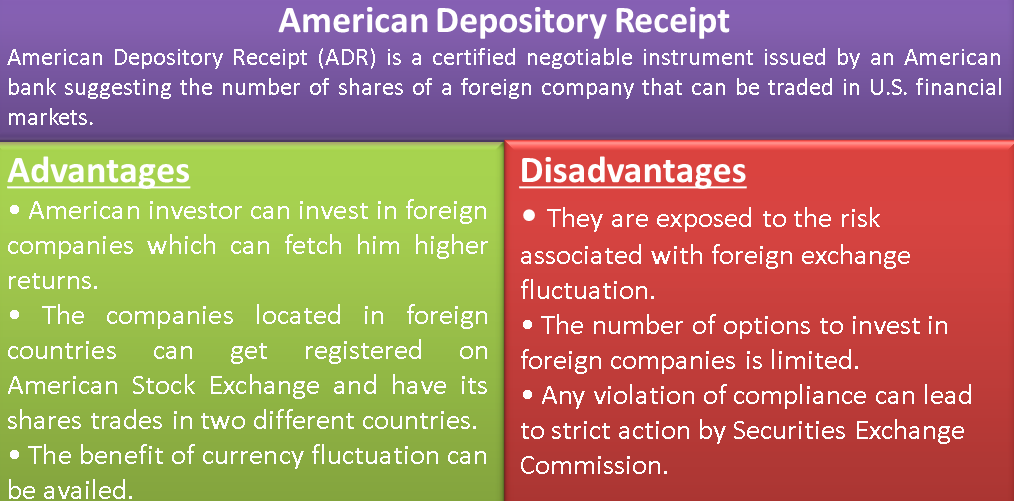American Depository Receipt is a depository receipt that represents the shares of a foreign company issued by a U.S bank that can be traded in U.S. equity markets.
Meaning of American Depository Receipt (ADR)
American Depository Receipt (ADR) is a certified negotiable instrument issued by an American bank suggesting the number of shares of a foreign company that can be traded in U.S. financial markets.
American Depository Receipts provide US investors with an opportunity to trade in shares of a foreign company. When the ADRs did not exist, it was very difficult for American investors to trade in shares of foreign companies as they had to go through many rules and regulations. To ease such hardship faced by American investors, the regulatory body Securities Exchange Commission (SEC) introduced the concept of ADR, which made it easier for an American investor to trade in shares of foreign companies.
American depository receipt fee varies from one cent to three cents per share depending upon the ADR amount and its timing.
American Depository Receipt (ADR) Example
Volkswagen, a German company, trades on New York Stock Exchange. Investors in America can easily invest in German companies through the stock exchange. Volkswagen is listed on the American stock exchange after complying with the required laws. On the other hand, if the shares of Volkswagen are listed in stock markets of countries other than the US, then it is termed as GDR.
Also Read: ADR vs GDR
Read ADR vs GDR to learn the difference between them.
American Depository Receipt (ADR) Process
Process of issuing ADRs.
- Shares sold to U.S. Bank.
The domestic company, already listed in its local stock exchange, sells its shares in bulk to a U.S. bank to get itself listed on a U.S. exchange.
- Issues Certificates (ADRs) against Shares as Security
The U.S. bank accepts the shares of the issuing company. The bank keeps the shares in its security and issues certificates (ADRs) to the interested investors through the exchange.
- Setting Price
Investors set the price of the ADRs through the bidding process in U.S. dollars. The buying and selling in ADR shares by the investors are possible only after the major U.S. stock exchange lists the bank certificates for trading.
- Approval by SEC
The U.S. stock exchange is regulated by the Securities Exchange Commission, which keeps a check on necessary compliance that need to be complied by the foreign company.

Advantages of American Depository Receipt (ADR)
Following are the advantages of ADRs:
- The American investor can invest in foreign companies, which can fetch him higher returns.
- The companies located in foreign countries can get registered on American Stock Exchange and have their shares trades in two different countries.
- The benefit of currency fluctuation can be availed.
- It is an easier way to invest in foreign companies as there are no restrictions to invest in ADR.
- ADR simplifies tax calculations. Trading in shares of a foreign company in ADR would lead to tax under US jurisdiction and not in the home country of the company.
- The pricing of shares of foreign companies in ADR is generally cheaper. Hence it provides additional benefits to investors.
Disadvantages of American Depository Receipt (ADR)
The following are the disadvantages of American Depository Receipts:
- Even though the transactions in ADR take place in US dollars, they are still exposed to the risk associated with foreign exchange fluctuation.
- The number of options to invest in foreign companies is limited. Only a few companies feel the necessity to register themselves through ADR. This limits the choice available to US investors to invest.
- The investment in companies opting for ADR often becomes illiquid. As an investor needs to hold the shares for the long term to generate good returns.
- The charges for the entire process of ADR are mostly transferred on investors by foreign companies.
- Any violation of compliance can lead to strict action by the Securities Exchange Commission.
Conclusion
ADRs allow US investors to trade in foreign companies’ shares. ADR makes it easier and convenient for domestic investors in the US to trade in foreign companies’ shares. ADR allows investors to diversify their portfolios by investing in companies that are not located in America. This eventually leads to investors investing in companies located in emerging markets, thereby leading to profit maximization for investors.


i want to know how can an indian investor buy shares of american companies like facebook, google……..ple tell in simpal way…
You can open trading a/c with any of the Indian brokers who is having tie up with some American partner who is providing trading facilities in American exchanges or an Indian broker having their presence in America, then you can trade in American companies listed in their exchanges
I am from Malaysia ,bough a National Bank of Greece share in New York Stock Exchange through a Malaysian Stock Company. And I received a letter from the stock company that the NGB share is cancelled in American Depository Receipts. Hence that, what what are the alternative matter to retain the said share.